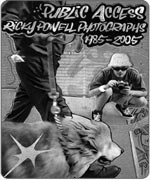|
Though the world knows him as one, Ricky Powell is
not a photographer. Not a self-described photographer,
anyway. Too modest for hyped titles, too hilarious for the
beaten path, put simply, he has always been in the right
place at the right time. With a camera permanently strapped,
he has documented the elite to the street, the fabulous to
the forgotten. His is a sincerely diverse collection,
capturing the je ne se quois in everyone who graces his
lens. Dubbed “The weegee of hip hop” by Fab 5 Freddy and
as the unofficial fourth member of the Beastie Boys, it’s
not what he is, but who he is. It’s not why he’s done
it, but how he’s done it. In a playground as vast as New
York City, natural curiosity, charisma and down-for-whatever
vibes were a perfect cocktail for the eternally youthful
cult-icon he is today. With a career that has expanded into
TV, radio, print journalism, fashion and a regular dose of
mischief, his life has been neither predictable nor boring.
But one thing is certain—there will “always be photos to
take.”
To let him tell it, his start came by knocking on a back
door at the Tampa Dome during the now-legendary Raising Hell
tour in 1986. He could take pictures, he explained, and as a
result, received a bed on the bus as Run DMC, the Beastie
Boys, Whodini, LL Cool J and the Timex Social Club made
their way across the southeastern United States. But maybe
his jump off began by photographing artists and celebrities,
then submitting the pictures to then-little known magazines
such as “Paper” and “Details” for use in their party
re-caps. Could it have been his classic role as one of the
geeks in the Beastie Boys’ “(You Gotta) Fight For Your
Right (to Party)” video? Or perhaps his career commenced
as he took snapshots while on the clock at various jobs:
substitute teacher, busboy, Frozade vender and bike
messenger (complete with a flower basket). Between 1985 and
1989, he “photographed on the chill out tip” and caught
images that would become permanently emblazoned in the mind
of every hip hop fan—backstage pictures of Run DMC, the
“Paul’s Boutique” album photos and Eric B. and Rakim
on tour.
That was 20 years ago. Since then, his work has been
published in “The New York Times,” “The Daily News,”
“Time,” “Newsweek,” “Ego Trip,” “Village Voice”
and “Rolling Stone,” among many other publications.
Clients such as Cannon, MTV and Capitol Records have
solicited his talent. He has hosted his own public access TV
program, “Rappin’ with the Rickster,” co-hosted
Columbia University’s radio funk show, released a DVD and
three books and is a columnist for “Mass Appeal.” His
subjects are innumerable: Rakim, Public Enemy, Slick Rick,
Eazy-E, Dondi, Doze Green, Steven Tyler, John Lee Hooker,
Keith Haring, Andy Warhol, Jean-Michele Basquiat, Grace
Jones, Madonna, Francis Ford Coppola. He doesn’t get
pushy. “I try not to be intrusive when I document.”
Famous for the captions beneath his photos, his commentary
is both insightful and funny. And his one-liners are
effortless. “Rick Rubin? He’s got some good ideas.” On
Russell Simmons, a personal theory applies: “You can tell
a man’s personality by the joint he smokes.”
 His fourth book, “Public Access: Ricky Powell
Photographs 1985-2005,” celebrates two decades of images
that are instantly recognizable. Each documents an exact
moment in time, many delivering just the right mix of
elements necessary to offer a story, but loose enough so
that its viewers can imagine their own. In his new book
Ricky writes, “...that’s what I love about pictures.
They preserve precious moments forever. I’ve been into
photographs ever since my mother started bringing home
sports magazines. I’d tear out my favorite pictures and
put them up in my room.” But what stirred his artistic
skill came long before he began sneaking into movie
premieres, hitting concerts and chopping it up with the cool
creative set. “Growing up, I couldn’t stand books
without photos. I always preferred nonfiction because I like
knowing what really went down, who was who, who was doinking
who. I got inspired by people’s experiences.” His fourth book, “Public Access: Ricky Powell
Photographs 1985-2005,” celebrates two decades of images
that are instantly recognizable. Each documents an exact
moment in time, many delivering just the right mix of
elements necessary to offer a story, but loose enough so
that its viewers can imagine their own. In his new book
Ricky writes, “...that’s what I love about pictures.
They preserve precious moments forever. I’ve been into
photographs ever since my mother started bringing home
sports magazines. I’d tear out my favorite pictures and
put them up in my room.” But what stirred his artistic
skill came long before he began sneaking into movie
premieres, hitting concerts and chopping it up with the cool
creative set. “Growing up, I couldn’t stand books
without photos. I always preferred nonfiction because I like
knowing what really went down, who was who, who was doinking
who. I got inspired by people’s experiences.”
The native New Yorker, using his trusted old-school
Minolta, now focuses solely on street photography: “I
carry my camera when I run errands.” His style works
because he can tell a story with and without words. He has
access to the exclusive, but willingly shares it. And as one
of the coolest historians of our time, Ricky Powell captures
what everyone else wants to. Not bad for a kid who knocked
on the back door.
“Public Access: Ricky Powell Photographs 1985-2005”
is available this fall from Miss Rosen’s imprint on
powerHouse Books.
|